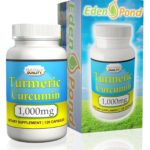Whether you’ve given birth before or you’re trying to conceive for the first time, prenatal vitamins play an active role in preparing your body for a healthy pregnancy. Although a healthy diet is the gold standard way of getting all the nutrients you need, sometimes it’s easy to fall short, even when you’re trying your best.
If your usual healthy diet does leave any gaps, prenatal vitamins fill them. Naturally, you might be wondering why there’s a difference between regular vitamins and prenatal ones. In this article, we’ll explore what they are, how they’re different, the essential roles they play in conception and embryonic development, and the various types available.
What are prenatal vitamins?

Prenatal vitamins are supplements that help you cover any gaps you may have in your diet. Such holes may arise even though you’re trying your best to live a healthy lifestyle because pregnancy places significant demands on your body.
Or, you may find you need prenatal vitamins because you’re a vegan, vegetarian, or you have coeliac disease. Regardless of the reason, there’s significant evidence to support the idea that taking them helps with developing your baby’s brain and spinal cord. Additionally, these vitamins will:
- Reduce the risk of neural tube defects
- Maintain a healthy iron balance during the first 12 weeks of your pregnancy, which also ensures your baby receives enough oxygen
- Ensure your baby benefits from strong bone growth
- Reduce your risk of developing pregnancy-related thyroid disease
- Reduce the risk of miscarriage and stillbirth
The majority of your baby’s significant development takes place during the first trimester. If you’re trying to conceive, the chances are you won’t see those two blue lines until you’re a couple of weeks into this period. As such, experts recommend that those who are actively trying to conceive should take prenatal vitamins during the conception period too.
However, if you’re already pregnant and reading this, you can still gain some benefits by starting now. Every supplement, alongside that healthy diet, helps your baby with their development.
What is the difference between regular vitamins and prenatal vitamins?
During your pregnancy, your body goes through a significant number of changes that increase your need for particular vitamins and minerals. For example, your growing baby will draw on your calcium supplies to grow their bones. At the same time, your blood volume increases dramatically so it can supply your baby through the umbilical artery. This means you need more iron to deliver oxygen, creating a healthy environment for your baby to thrive in.
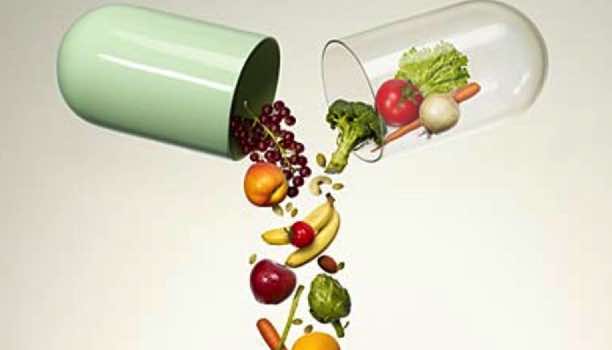
So, while prenatal vitamins may have a lot of the same vitamins and minerals as regular ones, their concentrations are tweaked to match your body’s demands. Alongside these changes, you benefit from:
- Folic acid; Also known as Vitamin B9, folic acid is essential for embryonic development and there’s some evidence suggesting that it increases your chances of implantation during the conception process. While we don’t understand the exact mechanisms, it prevents neural tube defects such as spina Bifida. Taking folic acid also reduces your baby’s risk of developing a hole in their heart, a cleft palate, and eye defects. Regarding how folic acid influences your health during pregnancy, it’s known to protect women against liver disease. As such, it becomes particularly important if you or a first-degree relative has encountered pre-eclampsia or eclampsia.
- Calcium; Taking calcium doesn’t just help your baby develop their bones; it’ll stop you from losing your bone density too. Alongside this, it helps your baby develop their heart rhythm, the sheath that protects their nerves, and increases the chances of them being born with blood-clotting abilities. As with above, getting enough calcium during your pregnancy reduces your risk of developing heart disease and preeclampsia.
- Iodine; Few regular vitamins will contain the same levels of iodine that prenatal ones do. Not having enough increases your risk of stillbirth and miscarriage, as well as pregnancy-related thyroid disease. As for your baby, they may have stunted growth, deafness, or mental disabilities in the absence of good iodine levels.
- Iron; Finally, there’s iron. Iron attaches to the hemoglobin in your blood cells so that oxygen can attach and then detach when it reaches essential tissues. Said tissues include your placenta, and while its there it will carry away the toxic products your placenta has to make through merely working so hard. In addition to helping your baby develop, it reduces your risk of iron deficiency anemia; we’ll discuss this more below.
In summary, prenatal vitamins vs. regular vitamins mean you’re getting everything you need in the right amounts, plus some extras for helping you and your baby develop. We’ll delve into the benefits of this a little more below.
The Benefits of Taking Prenatal Vitamins
Now we’ll delve a little further into the science-based evidence for prenatal vitamins. According to one study, taking them during pregnancy when smoking reduces the risk of placental abruption. While smoking during pregnancy isn’t recommended, this does demonstrate that they act as a protective factor for women who don’t smoke too. Placental abruption is a leading cause of maternal mortality and can lead to poor birth outcomes, which means taking them consistently leads to a safer birth.
Another study, performed on mice, demonstrates how getting the right amount of prenatal vitamins prevents oxidative stress, which is the body’s ability to address a build up of toxins. Similarly, it shows that they reduce the risk of newborn death. While these studies were performed on mice, they do suggest that attaining the right balance of prenatal Vitamin C can reduce post-natal deaths. It’s worth noting that randomized studies conducted on animals are commonplace, as ethical boards rarely permit such studies on fetuses and expectant mothers.
A further trial has demonstrated how striking the proper levels of Vitamin D during your pregnancy is essential. Prenatal vitamins allow your body to produce the right levels of 25-hydroxyvitamin D, which plays a role in kidney function, neurological development, and reducing post-natal depression.
Finally, another study demonstrates how obtaining the right amount of folic acid isn’t just crucial for neurological development; it prevents overall growth retardation. This is particularly important in those who may not achieve a balanced diet during their pregnancy, for whatever reason. Check the video to learn more about Folic Acid and it’s crutial role in pregnancy.
The Best Prenatal Vitamins 2019
With all of the above in mind, you need to find the best prenatal vitamins for you and your pregnancy. Which prenatal vitamins are the best depends on several factors:
- Whether you prefer an organic or vegan option
- If you require DHA as part of your prenatal vitamin regimen
- You may want to try chewable over swallowing, especially if you have morning sickness
- Finding the right over the counter prenatal vitamins
Taking all of the above into account, we’re going to highlight which prenatal vitamins we feel may be best for your pregnancy.
Best organic prenatal vitamins
Many medications contain synthetic forms of the vitamins and minerals your body needs. While they’ll still do the trick, it’s natural to seek an organic form if you’re aiming for a natural way of living.
Arguably, organic prenatal vitamins feature the purest forms of their constituents. They’re also free from synthetic colorings and coatings, allowing your body to absorb the nutrients faster.
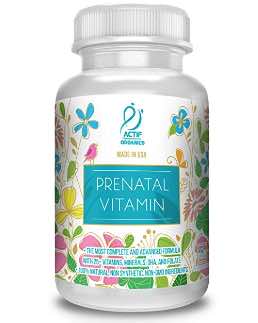
Our recommended organic prenatal vitamins come from Actif. In addition to following the guidelines for what pregnant women need, they:
- Are the only product available with a non-GMO blend, which means none of the contents have been genetically altered.
- They’re allergen free, making them ideal for those who are sensitive.
- They also contain probiotics, which balance your gut flora.
- There’s a three-month supply, so you only need to purchase one pack per trimester once you fall pregnant.
- All of the colorings come from natural vegetable sources.
It’s also worth noting that while these prenatal vitamins are organic, the FDA approves them for use.
Best over the counter prenatal vitamins
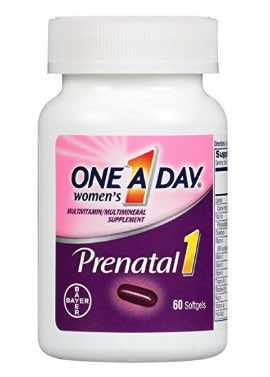
If you’re looking for a straightforward option that you can buy over the counter, try One A Day Women’s Pre Natal Formula.
As a two-pack, these over-the-counter prenatal vitamins contain all of the vitamins and minerals you need in the correct amounts, as well as:
- The right balance of folic acid for single pregnancy development
- DHA in its liquid form, which helps to support fetal eye and brain development
- No gluten products, making them ideal if you have celiac disease
Additionally, One A Day Women’s Pre Natal Formula gets the nod from leading OBGYNs. As such, you know you’re taking a vitamin your medical team approves of.
Best prenatal vitamins with DHA
Docosahexaenoic acid, also known as DHA, is an Omega-3 compound that’s essential for embryonic development. In addition to helping your baby’s eyes and brain development, research shows that it improves maternal and newborn outcomes in those born to mothers with Type II Diabetes.
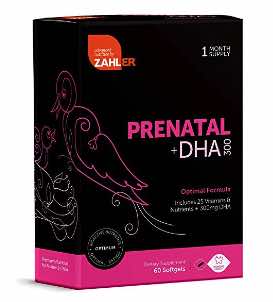
If DHA is important to you, we recommend Zahler’s product. It contains 300mg of DHA, which is slightly higher than the daily recommended amount for pregnant women. As such, you should consult your doctor before taking them – which is what the manufacturer recommends too. However, in terms of DHA levels, it’s the highest we can find.
Best chewable prenatal vitamins
Chewable vitamins aren’t just for children. If the idea of swallowing tablets makes you want to gag, you can try chewable prenatal vitamins too. Chewable prenatal vitamins may also benefit you if you suffer from particular digestive complaints.
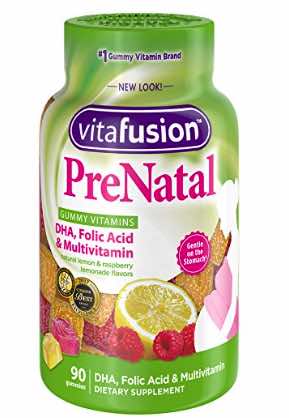
We recommend Vitafusion Prenatal Gummy Vitamins, as each pack contains enough for one trimester. Each one includes as much Vitamin C as ten tangerines, plus their chewable nature means they’re easier on your digestive system. As such, you may find them more comfortable to take if you’re suffering from morning sickness, which can affect the absorption of vitamins.
Best vegan, gluten-free, and lactose-free prenatal vitamins
If you adhere to a special diet, you’ll already know how difficult it is to find products that meet your needs. For example, if you’re vegan, you might not have easy access to vitamins that don’t contain animal products. Similarly, if you can’t tolerate lactose or gluten, taking prenatal vitamins that trigger your allergies will neither benefit you nor your baby.
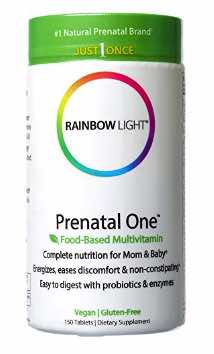
Rainbow Light is a brand that produces vegan prenatal vitamins, which also cater to gluten and lactose-free women. This is especially handy for those who suffer from coeliac disease, as a lactose intolerance usually accompanies a gluten intolerance. They also come with the added edge of featuring probiotics, which can keep your digestive system ticking along, even when pregnancy makes it a little sluggish.
When should I start taking prenatal vitamins?
If you’re trying to conceive now, start taking them immediately. Or, if you know you want to conceive in the future, start taking them two to three months in advance. As we’ve already mentioned, doing this prepares your body for a baby-friendly environment. Similarly, if it takes you a few weeks to detect your pregnancy, taking them before you know you’re pregnant ensures your baby experiences their nutritional benefits from the moment of implantation.
With that said, if your pregnancy is a happy surprise and you want to enjoy a healthy pregnancy, start taking them right away. Starting now is better than not starting at all, so don’t hold back.
Is taking prenatal vitamins before my pregnancy safe?
Taking prenatal vitamins before your pregnancy is safe. According to WebMD, leading obstetricians recommend doing so to reduce the risk of miscarriage. In addition to taking your prenatal vitamins, you should treat your body as though you are already pregnant. This means quitting smoking, no more alcohol, and consuming safe levels of caffeine only.
Should I continue taking prenatal vitamins after my pregnancy?
While the Mayo Clinic recommends continuing your prenatal vitamins after your pregnancy if you are breastfeeding, the American Pregnancy Association recommends switching to a post-natal vitamin instead. Although your body will strive to produce everything your baby needs while you breastfeed, the process is exhausting. Couple this with the fact that your newly hectic lifestyle may lead to a poorer diet than usual and it makes sense to ensure you’re getting all the nutrients you need.
Taking a postnatal vitamin means you switch those prenatal values so that they’re ideal for lactating women. Vitamin D is particularly important, as few of us get enough of it, and a depletion increases your risk of postnatal depression. Once you stop breastfeeding, you can stop the vitamins too.
What are the side effects of prenatal vitamins?
Most women will experience few or no side effects when they take prenatal vitamins. However, some of the constituents can cause small changes in your body habits. For example:
- The iron content can affect your stools; In addition to experiencing a little constipation, you may also find your stools become darker. If your constipation becomes problematic, discuss adding a mild laxative to your obstetric care with your OBGYN.
- Nausea; Some women report that the sudden increase in vitamins and nutrients makes them feel nauseous as their body adapts. However, this usually decreases following the first trimester.
- Your urine may change; The color and the odor of your urine may change. However, as you’re at higher risk of UTIs during pregnancy, it’s important to ensure such changes aren’t related to your urethra, just to be on the safe side.
As you can see, prenatal vitamins differ significantly from regular vitamins. They have a vitamin and mineral content that tunes itself to your body, plus some extras that are essential for your baby’s growth plus your personal health. There’s plenty of science to back taking them, and whether you’re a vegan or you prefer chewable supplements, there’s a vitamin out there for you.
Ideally, you should start taking your vitamins before falling pregnant, but if your pregnancy is a happy surprise then start taking them immediately. If you choose to breastfeed, switch to post-natal vitamins for lactating moms instead.
Most women don’t experience side effects, but if you do and they’re concerning you, talk to a medical professional. Finally, if you have a chronic disease, your pregnancy is high risk, or you’re carrying more than one baby, talk to your doctor before making a prenatal vitamin purchase.

